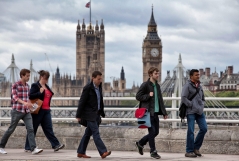
Dr John Sentamu has condemned businesses that pay less than the living wage, calling on the government to put an end to the harsh reality for millions of UK workers: "Low wages equals living in poverty."
The Archbishop is the chairman of the Living Wage Commission, an independent inquiry into the rise of low pay and working poverty across Britain.
Its first report, published in February, found that 6.7 million of the 13 million people in poverty in the UK are in working households – the first time that the figure has reached over 50 per cent.
The report also revealed that 21 per cent of the workforce, 5.24 million Brits, are paid below a Living Wage, while housing costs have tripled in 15 years and bills have increased by a staggering 88 per cent since 2009.
Statistics released earlier this year by foodbank provider the Trussell Trust in partnership with parenting website Netmums indicated that one in five working parents have had to choose between paying an essential bill and providing food for their family in the past year. In addition, almost four in five admitted to being forced to cut spending and 43 per cent said they were "just about coping" with budgeting.
In its final report published today, the Commission blasts the minimum wage system, which currently stands at £6.31 an hour for workers over the age of 21. The BBC's business editor Kamal Ahmed notes that this is about 20 per cent lower than "what it actually costs to live".
"Working and still living in poverty is a national scandal. For the first time, the majority of people in poverty in the UK are now in working households," Archbishop Sentamu has declared.
"The campaign for a Living Wage has been a beacon of hope for the millions of workers on low wages struggling to make ends meet. If the government now commits to making this hope a reality, we can take a major step towards ending the strain on all of our consciences."
The Commission has urged the government to commit to lowering the number of low paid workers by one million in the next 6 years, and suggested that higher taxes for private firms could go some way to help meet this goal.
Director of policy and external affairs at the British Chambers of Commerce, Dr Adam Marshall, however, says that "some businesses simply cannot afford to pay a living wage just yet" but "as many employers as possible" will be encouraged to make the transition.
Business Secretary Vince Cable warned that businesses may be forced to cut back on staff if they have to pay a higher wage.
"The only real way of achieving sustainable increases in living standards is by focusing on economic growth, employment and reducing taxes for the low paid. This is exactly what we are doing," he insisted.
Chuka Umunna, Labour's Shadow Business Secretary, was more positive, however. She has labelled the report "a powerful and timely case for tacking the growing scandal of low pay".




















